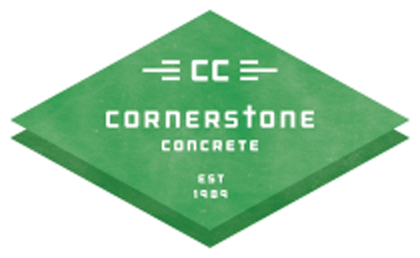- Concrete driveways cost 45% more upfront than asphalt but vary by size and style.
- Concrete lasts 40-50 years and supports heavier vehicles; asphalt lasts 15-20 years.
- Concrete cures in 10 days; asphalt is usable immediately and dries in 2-3 days.
- Concrete offers more styles but stains easily; asphalt has fewer styles but hides stains.
- Concrete requires sealing with minimal upkeep; asphalt needs frequent resealing but is easier to repair.
- Concrete withstands heat but may crack in the cold; asphalt softens in heat and may crack when re-hardened.
- Driveway choice depends on homeowner needs; Cornerstone Concrete also offers asphalt options.
Whether you are looking to add value to your residential home, replace your current driveway, or install a new one, you will have 2 popular materials to choose from: concrete or asphalt; but which is better? Both materials have their strengths and weaknesses depending on factors like:
- Cost
- Durability & Use
- Installation
- Appearance
- Maintenance & Repairs
- Weather
Understanding how these factors can affect your material choice will benefit you in the long run, saving you money, time, and effort. Especially knowing which material will work best for you through those Wisconsin and Minnesota winters. Of course, our concrete driveway experts believe concrete fits most cases, but read on to be sure concrete is right for you. To learn more, read our blog about the difference between concrete and cement.
1. Cost
The initial, up-front cost of concrete driveways tends to be more expensive than asphalt, costing about 45% more than an asphalt driveway. While prices can change due to material costs, customers tend to see this initial cost difference for installation. Of course, the size of the job and style additions can affect this cost as well.
2. Durability & Use
Concrete driveways generally last longer than asphalt. Concrete usually lasts 40-50 years, while asphalt usually lasts 15-20 years if both are maintained properly and regularly. Keep in mind, neither driveway material will reach their longevity potential unless properly taken care of.
When it comes to use, concrete driveways can handle more weight than asphalt can. If you want to park a truck and/or RV in your driveway, concrete would be better for you than asphalt.
3. Installation
The installation process varies from concrete to asphalt. Concrete is a mixture of aggregates, stone, and cement, using water to help bind the ingredients together. Once a concrete driveway is poured it must dry for 10 days to cure, then you are able to drive on your driveway. Asphalt is a mixture of aggregates and stone, using petroleum as the binding adhesive. High temperatures are used to mix, soften, and roll the asphalt out before cooling. Once cooled, your driveway is complete! While it takes 2-3 days for asphalt to completely dry, you can drive on it immediately.
4. Appearance
Concrete and asphalt are both aesthetically pleasing materials to use for a driveway. Which one to choose can depend on the style you prefer. Concrete can offer a variety of style options with coloring and stamping, allowing you the choice to match your driveway to your home; however, this comes at a higher cost. On the other hand, concrete is a light gray color and can be easily stained.
Asphalt can enhance the look of your home if you would like your driveway to match the street. However, asphalt driveways do not offer the same style options concrete can, disallowing you to match your driveway to your home. On the bright side, asphalt driveways are a darker color naturally hiding stains and rust.
5. Maintenance & Repairs
A concrete driveway does not require too much maintenance with a proper sealant added. Sealant will help enhance the look of your driveway and be more resistant to weather conditions. Concrete also requires fewer repairs over its lifetime than asphalt.
Asphalt driveways require more maintenance than concrete. They need a coat of sealant 6 months to 1 year after installation, plus an additional resurfacing every 3-5 years to lengthen its lifespan. While more maintenance is necessary, potholes and cracks are simple to repair. Even with a few DIY options available. Prepare your driveway for the season ahead by learning effective winter care strategies in our prepping for winter guide.
6. Weather
Your local weather conditions should be a consideration when choosing between concrete and asphalt. Concrete tends to do well in hotter areas without experiencing too much stress, while extreme cold temperatures can cause concrete to crack, making winter care crucial for Minnesota and Wisconsin residents. In addition, road salt can potentially eat away at a concrete driveway surface.
If you live in a high-heat area, asphalt can become gooey or sticky. Asphalt also goes through temperate cycles, softening in heavy heat and then re-hardening as temperatures cool. This process can cause cracks or sags. Asphalt can also hold heat in high temperatures, so it is not a good idea to walk barefoot during summer months.
While each material has its downfall with certain weather patterns, with proper installation, care, and maintenance your driveway can withstand adverse conditions.
In the End, It Depends
Overall, a driveway is a large expense, whether you choose concrete or asphalt. While there is no clear winner between the two popular materials, the decision comes down to you and the needs of your home.
Trust our expertise at Cornerstone Concrete to guide you to a better quality driveway, particularly in Midwest climates. While we believe most homeowners would benefit from a concrete driveway, there are circumstances when asphalt is better for you than asphalt. We do work with a local asphalt company to help clients that we might not be the best fit for.
To explore whether a concrete driveway is the right choice for your home, contact us online, give us a call, or request a free estimate. If you’re considering asphalt, check out Blacktop Concepts for more information.





